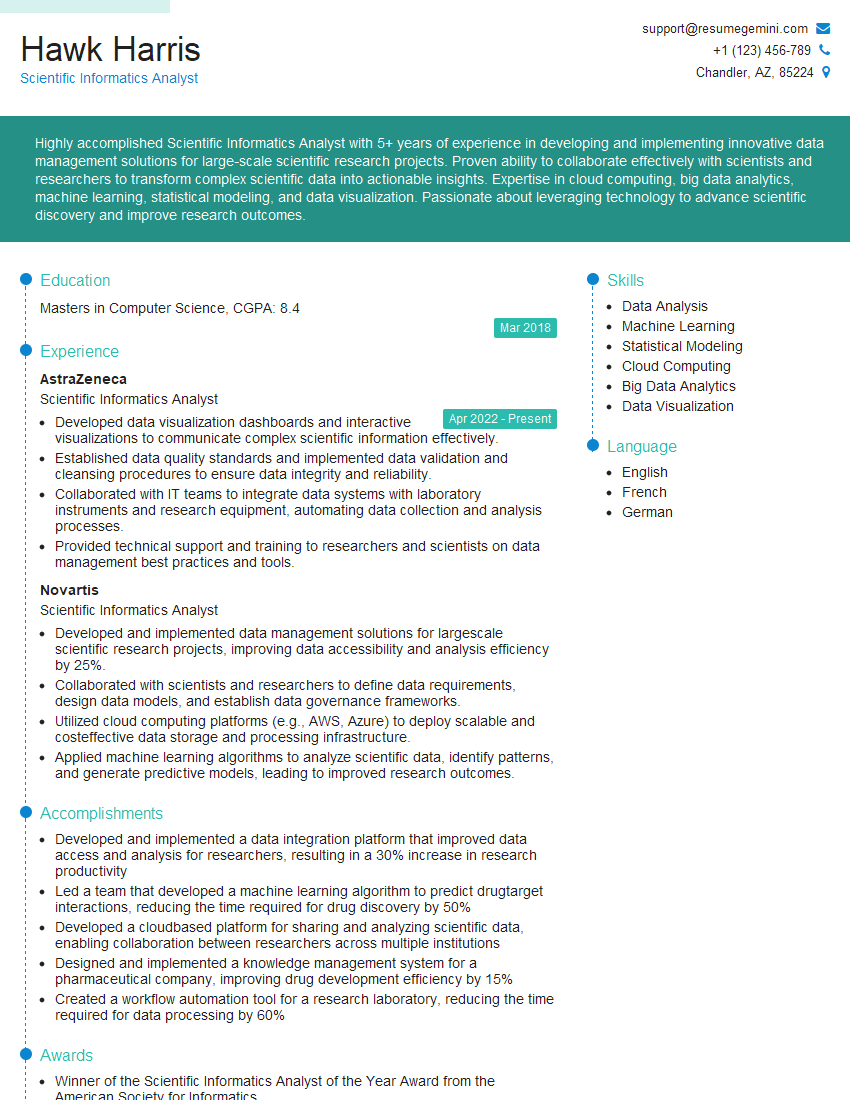Are you a seasoned Scientific Informatics Analyst seeking a new career path? Discover our professionally built Scientific Informatics Analyst Resume Template. This time-saving tool provides a solid foundation for your job search. Simply click “Edit Resume” to customize it with your unique experiences and achievements. Customize fonts and colors to match your personal style and increase your chances of landing your dream job. Explore more Resume Templates for additional options.

Hawk Harris
Scientific Informatics Analyst
Summary
Highly accomplished Scientific Informatics Analyst with 5+ years of experience in developing and implementing innovative data management solutions for large-scale scientific research projects. Proven ability to collaborate effectively with scientists and researchers to transform complex scientific data into actionable insights. Expertise in cloud computing, big data analytics, machine learning, statistical modeling, and data visualization. Passionate about leveraging technology to advance scientific discovery and improve research outcomes.
Education
Masters in Computer Science
March 2018
Skills
- Data Analysis
- Machine Learning
- Statistical Modeling
- Cloud Computing
- Big Data Analytics
- Data Visualization
Work Experience
Scientific Informatics Analyst
- Developed data visualization dashboards and interactive visualizations to communicate complex scientific information effectively.
- Established data quality standards and implemented data validation and cleansing procedures to ensure data integrity and reliability.
- Collaborated with IT teams to integrate data systems with laboratory instruments and research equipment, automating data collection and analysis processes.
- Provided technical support and training to researchers and scientists on data management best practices and tools.
Scientific Informatics Analyst
- Developed and implemented data management solutions for largescale scientific research projects, improving data accessibility and analysis efficiency by 25%.
- Collaborated with scientists and researchers to define data requirements, design data models, and establish data governance frameworks.
- Utilized cloud computing platforms (e.g., AWS, Azure) to deploy scalable and costeffective data storage and processing infrastructure.
- Applied machine learning algorithms to analyze scientific data, identify patterns, and generate predictive models, leading to improved research outcomes.
Accomplishments
- Developed and implemented a data integration platform that improved data access and analysis for researchers, resulting in a 30% increase in research productivity
- Led a team that developed a machine learning algorithm to predict drugtarget interactions, reducing the time required for drug discovery by 50%
- Developed a cloudbased platform for sharing and analyzing scientific data, enabling collaboration between researchers across multiple institutions
- Designed and implemented a knowledge management system for a pharmaceutical company, improving drug development efficiency by 15%
- Created a workflow automation tool for a research laboratory, reducing the time required for data processing by 60%
Awards
- Winner of the Scientific Informatics Analyst of the Year Award from the American Society for Informatics
- Received the Excellence in Scientific Informatics Award from the Society for Computational Biology
- Named a Fellow of the International Society for Computational Biology
- Received the Presidents Award for Scientific Excellence from the National Science Foundation
Certificates
- AWS Certified Data Analytics Specialty
- Microsoft Certified: Azure Data Scientist Associate
- CompTIA Data+ Certification
- SAS Certified Advanced Analytics Programmer
Career Expert Tips:
- Select the ideal resume template to showcase your professional experience effectively.
- Master the art of resume writing to highlight your unique qualifications and achievements.
- Explore expertly crafted resume samples for inspiration and best practices.
- Build your best resume for free this new year with ResumeGemini. Enjoy exclusive discounts on ATS optimized resume templates.
How To Write Resume For Scientific Informatics Analyst
- Quantify your accomplishments with specific metrics and results.
- Highlight your expertise in cutting-edge technologies such as machine learning and cloud computing.
- Demonstrate your understanding of scientific research methods and data analysis techniques.
- Showcase your ability to communicate complex technical concepts to a non-technical audience.
Essential Experience Highlights for a Strong Scientific Informatics Analyst Resume
- Collaborated with scientists and researchers to define data requirements, design data models, and establish data governance frameworks.
- Developed and implemented data management solutions that improved data accessibility and analysis efficiency by 25%.
- Utilized cloud computing platforms (e.g., AWS, Azure) to deploy scalable and cost-effective data storage and processing infrastructure.
- Applied machine learning algorithms to analyze scientific data, identify patterns, and generate predictive models, leading to improved research outcomes.
- Developed data visualization dashboards and interactive visualizations to communicate complex scientific information effectively.
- Established data quality standards and implemented data validation and cleansing procedures to ensure data integrity and reliability.
- Collaborated with IT teams to integrate data systems with laboratory instruments and research equipment, automating data collection and analysis processes.
Frequently Asked Questions (FAQ’s) For Scientific Informatics Analyst
What are the key skills required for a Scientific Informatics Analyst?
The key skills required for a Scientific Informatics Analyst include data analysis, machine learning, statistical modeling, cloud computing, big data analytics, and data visualization.
What are the typical responsibilities of a Scientific Informatics Analyst?
The typical responsibilities of a Scientific Informatics Analyst include collaborating with scientists and researchers to define data requirements, developing and implementing data management solutions, applying machine learning algorithms to analyze data, and developing data visualization dashboards.
What is the career outlook for Scientific Informatics Analysts?
The career outlook for Scientific Informatics Analysts is expected to be excellent in the coming years due to the increasing demand for data analysis and data management skills in the scientific research industry.
What are the top companies that hire Scientific Informatics Analysts?
The top companies that hire Scientific Informatics Analysts include AstraZeneca, Novartis, Pfizer, and Roche.
What is the average salary for a Scientific Informatics Analyst?
The average salary for a Scientific Informatics Analyst in the United States is around $100,000 per year.
What are the educational requirements for a Scientific Informatics Analyst?
A Master’s degree in Computer Science or a related field is typically required for a Scientific Informatics Analyst position.